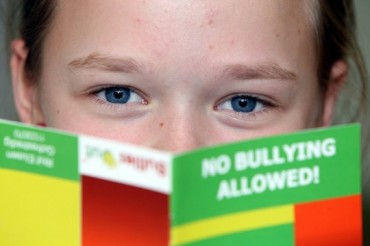
STUDY: Youth More Likely To Be Bullied At Schools With Anti-Bullying Programs
Schools across the nation have implemented anti-bullying campaigns, complete with speakers, posters, slogans and more – but a recent study hailing from the University of Texas-Arlington claims such efforts may actually cause more bullying.
Essentially researchers suggest anti-bullying campaigns, despite good intentions, teach students how to bully or may even plant the seed inside students who had not exhibited aggressive behavior previously.
“One possible reason for this is the students who are victimizing their peers have learned the language from these anti-bullying campaigns and programs,” Seokjin Jeong, an assistant professor of criminology and criminal justice at UT-Arlington and lead author of the study, said in a campus statement.
Jeong did not respond to requests for comment by The College Fix. His research, titled “A Multilevel Examination of Peer Victimization and Bullying Preventions in Schools,” was recently published in The Journal of Criminology.
In an interview with CBS, he said his findings were a surprise – that his hypothesis going into the research was that anti-bullying programs would help curb the problem. Instead, he said he found the opposite was true, calling it “very disappointing.”
Today, 75 percent of schools report a violent incident to the police on a weekly basis and 25 percent of schools experience bullying on a daily basis, according to stats cited in the Journal of Criminology.
“Our anti-bullying programs, either intervention or prevention does not work,” Jeong said. “There is a possibility of negative impact from anti-bullying programs.”
To conduct the research, Jeong and co-researcher Byung Hyun Lee, a doctoral student in criminology at Michigan State University, analyzed data from the Health Behavior in School-Aged Children 2005-06 survey, using a sample size of 7,001 students from nearly 200 schools. The survey is conducted every four years by the World Health Organization and administered in the United States from grades six to ten.
Some criticized the study’s results because researchers used older data, but the results still warranted alarm, as the research prompted national headlines when it was publicized this fall. The results contradicted claims that popular anti-bullying programs are highly effective.
“The schools with interventions say, ‘You shouldn’t do this,’ or ‘you shouldn’t do that.’ But through the programs, the students become highly exposed to what a bully is and they know what to do or say when questioned by parents or teachers,” Jeong stated in a campus release.
The study’s results state: “Surprisingly, bullying prevention had a negative effect on peer victimization. Contrary to our hypothesis, students attending schools with bullying prevention programs were more likely to have experienced peer victimization, compared to those attending schools without bullying prevention programs. It is possible that bullies have learned a variety of antibullying techniques but chose not to practice what they have learned from the program. Sometimes, bullies maintain their dominant social status among peers in school. As a result, the preventive strategies may become ineffective.”
According to UT-Arlington officials, the study also revealed newer anti-bullying efforts “should focus on more sophisticated strategies rather than just implementation of bullying prevention programs along with school security measures such as guards, bag and locker searches or metal detectors.”
“Furthermore, given that bullying is a relationship problem, researchers need to better identify the bully-victim dynamics in order to develop prevention policies accordingly.”
Fix contributor Samantha Watkins is a student at Point Loma Nazarene University.
IMAGE: Working Word/Flickr
Like The College Fix on Facebook / Follow us on Twitter





Please join the conversation about our stories on Facebook, Twitter, Instagram, Reddit, MeWe, Rumble, Gab, Minds and Gettr.